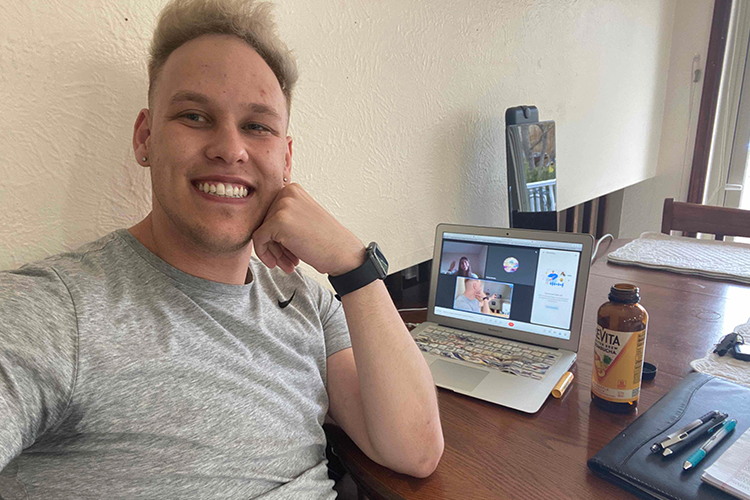
Mr. Mason in conference with students participating in internships. photo courtesy of Matt Mason
For students on the lookout for opportunities, DPS internships are here!
During the COVID-19 era, many things have been shoved to the back of students’ minds. Between struggling with school, mental health issues, and a socially distanced world, internships, apprenticeships, and jobs may have lost their importance. However, the DPS Launch Internship Program is still here to support students looking for these opportunities and to prepare them to enter the workforce.
“I’m here to support our students, to present them with opportunities and options,” Matt Mason, DPS Career and College Success Navigator, stated. “I’m here to help you find your future!”
To begin with, it is important to know the differences between apprenticeships, jobs, and internships:
“Once the student has identified which one they would like to pursue, we offer support through the application, how to build a resume, what sort of training is required, and a mock interview,” Mason stated. “It is all about preparing our students for a competitive process.”
This process is called the DPS Launch Internship Program; it offers ten credits for spring and fall internships, about five credits for the summer ones, and about three college elective credits that are transcribable and can be sent to any sort of school. They are given in partnership with Colorado State University Global credit. However, it is up to the student’s school to process them.
During this process, students are assisted through the application process. They are taught how to structure their resume (and its difference from a cover letter), which sort of work experience is useful, what kind of skills should be a must, and how to make their resumes as concise and eloquent as possible. Participants also receive training on paperwork: how to keep track of their hours, how evaluations are done, and how to navigate agreement sheets. Students learn about the importance of personal appearance, the role of an intern, what kind of pressure might be on their shoulders, the support system interns will have, and proper conversations for the workforce. The trainers in the program offer tips such as, “If it is not something you would say or do in front of your grandma, then it is not appropriate!”
“The hardest part of the internship process was getting adjusted to working in an office environment (online office environment this year). It was a definite learning curve for the first week or two learning how to communicate with my supervisors and other co-workers,” Lauren Simasko, a junior at TJ, stated. “However, everyone at the Better Business Bureau was so kind and welcoming, so I had a lot of support and was able to quickly adjust. I think my favorite part of the application process was the interview. I had never done any professional interviews before so it was an awesome experience and I was able to get more skills.”
One-on-ones with students are also held. These meetings, though usually underestimated, are crucial. They help advisors to advocate for their interns, encourage the students to communicate with their supervisors, and, if needed, keep the interns accountable. The one-on-ones offer a safe and secure space for the intern to build relationships and have healthy conversations about their work, pressure, or goings-on outside the internship or school.
“Before this internship, I was always hesitant to ask questions when I needed help, but I learned throughout this internship that everyone asks questions; no one has all the answers…I encourage anyone who can to apply for an internship because it has taught me so much… It doesn’t even feel like work. It’s truly an experience like no other and if you are given the opportunity to get an internship, take it!” Simasko enthused.
Internships and apprenticeships are overall a great learning experience for students that want to develop their work skills and explore what they would like to do in the future; internships and apprenticeships also allow interns to apply what they have learned at school to the real world, start networking, and improve themselves.
“I know there are students looking for these opportunities. I just need them to reach me, then we can work something out,” Mason remarked. Students looking for more information can contact matt_mason@dpsk12.net.
Time’s up, TJ! Take the first step!